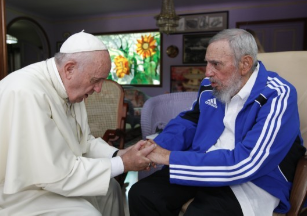
In Cuba, homage to the Castro brothers, silence over the victims of the
regime, the refusal to meet with dissidents. In the United States, the
exaltation of freedom against the “forms of modern tyranny.” The anguished cry
of a Cuban exile
by Sandro Magister

ROME, October 1, 2015 - Days later and with the emotional residue swept away,
the journey of Pope Francis to Cuba and the United States is unveiling its real
connotations. Which are political and ecclesial at once.
As a politician, Jorge Mario Bergoglio has shown himself to be capable,
pragmatic, implacable at times. He presents himself to the world as the advocate
of the poor, of the oppressed, of the “discarded,” and says it with actions even
more than with words. He goes to the Caritas soup kitchen, meets with the
homeless, visits a school for the disadvantaged, mingles with immigrants and
illegals, enters a prison.
Eight of these direct contacts were on the official program of the journey, and
he added even more on his own.
But mind, all of them strictly in the United States. Not even one in Cuba.
Not a word there for the thousands of Cubans swallowed up by the sea while
fleeing from tyranny. No call for the release of political prisoners. No caress
for their mothers, wives, sisters, arrested by the dozens so that they couldn’t
even go to the pope’s Mass.
Pressed by journalists on the plane heading for Washington, Francis said no, no
meeting with dissidents was planned, and he kept to the program.
And yet this was not something unthinkable from the start. A few weeks earlier,
the Cuban regime had allowed American secretary of state John Kerry, visiting
Cuba to reopen the embassy, to meet with roughly thirty dissidents.
One of these, the most authoritative, a Catholic, nevertheless had to hide
behind the cloak of anonymity in order to write his aggrieved commentary on the
pope’s visit, for the missionary agency “Asia News.” In 1998, when John Paul II
went to Cuba, he had even been able to take the offerings up to the altar during
the Mass in the Plaza de la Revolución, while the square resounded with rhythmic
chants of “Libertad!,” a word the pope used 13 times in his homily.
This time, nothing of the kind. The Castrist police catalogued and screened
everyone coming to Mass with Francis, in Havana and the other cities, and
peppered the crowds with informants.
In the nine discourses he gave in Cuba, Bergoglio used the word “freedom” only
once, requesting it for the Church on the island together with “all the means
necessary.” He paid repeated public homage to the Castro brothers and gave a
friendly and admiring account of his private conversation with Fidel.
To general astonishment, he dedicated his clearest and most direct political
comments not to Cuba but to Colombia: to the secret negotiations between the
Bogotà government and the leaders of the Colombian guerrillas that were underway
during those same days in Havana, with Raúl Castro as host and mediator.
And the good news, that of the agreement reached after seventy years of
massacres and half a million victims, came when the pope was in the United
States, on the eve of his speech to the United Nations. An agreement that was
immediately credited by all to him, to Francis, and to the “decisive” move of
that unexpected appeal raised from Havana.
The calculated silence on freedom in Cuba was counterbalanced by the expansive
praise that Bergoglio dedicated to this in the United States.
The true key political discourse of this journey to the Americas, in fact, was
not the one he gave to Congress, nor the one from the tribunal of the UN, both
of these tailor-made to be welcomed by all and not antagonize anyone, but the
one in Philadelphia, in the place, he said, where “the Declaration of
Independence stated that all men and women are created equal, that they are
endowed by their Creator with certain inalienable rights, and that governments
exist to protect and defend those rights.”
Which are life, liberty, and the pursuit of happiness, and therefore, he added,
“our irreducible freedom in the face of every claim to absolute power” and of
all those “forms of modern tyranny [that] seek to suppress religious freedom, or
try to reduce it to a subculture without right to a voice in the public square.”
What a shame that in Cuba these words of his were kept in the dark.
____________
This commentary was published in "L'Espresso" no. 40 of 2015, on newsstands as
of October 2, on the opinion page entitled "Settimo cielo" entrusted to Sandro
Magister.